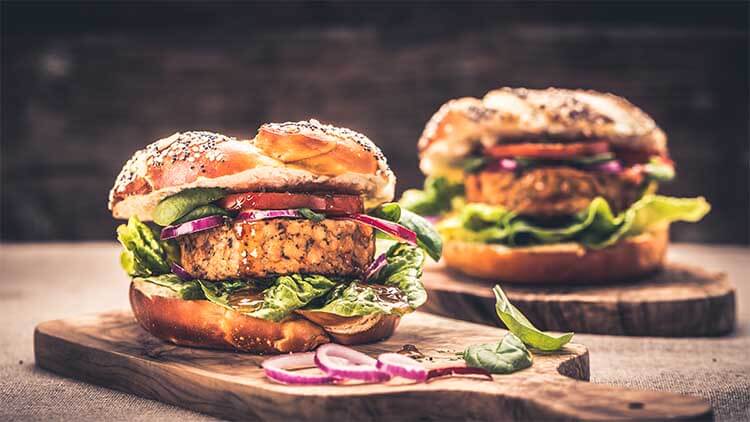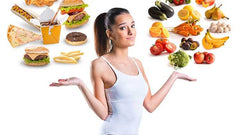
Getting Vegetarian Protein into Your Diet Has Never Been Easier
You might think that meat is your only option for getting protein, but that isn’t strictly true. If anything, with some careful planning you can easily replace animal proteins with vegetarian proteins and still meet all of your daily macronutrient goals!
So if you’re worried that by going vegetarian, you may be stopping your body from receiving the protein it needs, you couldn’t be more wrong…
You can still get protein to build/repair tissues (including creating new muscle, bones, skin and blood), increase fat burn, control appetite, reduce calorie intake and lose weight.
Veggie or non-veggie, you’ve got plenty of vegetarian protein options to give your body the protein boost it deserves. Come take a look and see the truth for yourself…
- What is vegetarian protein?
- What are your vegetarian protein options?
- High protein vegetarian foods
- Best vegetarian protein source

What is vegetarian protein?
To put it simply, vegetarian protein is a protein that has been derived from non-meat sources such as plant products.
Now, there are only a few plant products – soybeans and quinoa – which contain complete proteins i.e. all 9 essential amino acids that your body needs on a daily basis (which it cannot create itself).
The rest have got a handful missing, meaning you will need to consume a diverse and varied diet in order to ensure you receive all of these important nutrients.

What is the difference between vegetable protein and animal protein?
Regardless of where you choose to source these protein amino acids from; your body will always seek to break them down to help fuel your body and repair/replenish tissue cells.
This means, as long as you make a conscious effort to consume all 9 essential amino acids; it doesn’t matter if you’re a vegetarian or keep up your carnivorous ways. Eat right and you can keep your body healthy.
Yet, what is the difference between animal and plant proteins? What makes one more popular than the other?
Honestly? The only real difference between the two is that most animal proteins contain all 9 amino acids, whilst plants are often lacking in methionine, tryptophan, lysine or isoleucine.
Now, this doesn’t mean that plants are a poor substitute for meat. Far from it! All it really indicates is that you’ll have to fill up your meals with a variety of plant products to keep it healthy, happy and functioning.

What are your vegetarian protein options?
Remember when we said that soybeans and quinoa are the only plant products to contain all 9 essential amino acids?
Well, unless you’re willing to munch on these all day long, you’re going to have to learn how to get protein as a vegetarian from other food sources.
So what are your options? Where else can you source vegetarian proteins from?
Luckily, you don’t have to look far, as proven by the following vegetarian protein foods on this list.
Vegetarian protein powder
The idea behind vegetarian protein powder is to provide your body with a source for fuel after a gruelling workout, whilst minimizing the amount of fats and carbs you consume.
Instead, by harnessing a blend of rice, peas and sunflower seeds; manufacturers have managed to isolate their protein amino acids and create a protein rich powder that can easily be integrated into your diet.
In fact, you can get plain and flavored vegetarian protein powders which you can easily mix with water, non-dairy milk, smoothies, oatmeal and other foods to help replenish your body.
TIP: When investing in this powder, you will need to compare prices by weight. For instance, protein powders made from grains and legumes are usually 50% cheaper than those made from seeds.

Tofu
Tofu is created from the curds of soy milk and comes in 3 forms: silken, firm or extra firm.
It is both filling and low in calories – making it an ideal way to bulk out your meals as it goes well with veggie stir-fries and salads.
More importantly, it is high in protein as just 100g of firm tofu will give you 8g of protein.

Soy
This versatile protein comes in many forms. On the one hand you can eat soybeans on their own, or alternatively you can turn them into soy milk, miso or tempeh and enjoy them that way.
In just 100g of soybeans you will find 15g of protein, making it an ideal substitute for meat (even if it is digested differently by your body).
Even its milk form packs a punch, as alongside containing 7g of protein per 240ml, it can also offer you a variety of nutrients e.g. calcium, vitamin D and vitamin B12.

Any others?
Truthfully, there are a few contenders when it comes to high protein vegetarian foods – many of which we are going to discuss in further detail below – but for a quick overview of your other options, you can also consider having: eggs, lentils, beans, oats, nuts and seeds.
High protein vegetarian foods
Naturally you want to maximize your protein intake with minimal effort, so it makes sense to have an awareness of all the best vegetarian protein options out there.
Below, we have compiled a list of all known vegetarian foods that are high in protein, so adding them to your diet couldn’t be easier.
Beans
Kidney, pinto, black or garbanzo… there are a number of bean types you can experiment with.
On average, they contain 15g of protein (per 240ml), and come with the added bonus of also being rich in other essential nutrients e.g. iron, folate, phosphorus, potassium and manganese (which are great for your body).
In fact, numerous studies have found them to help lower cholesterol and blood pressure levels, whilst giving you greater control over your blood sugar and excess body fat.
Another legume/type of bean to consider is chickpeas (otherwise known as garbanzo beans). Similar to beans, they contain 15g of protein per 240ml (when cooked).

Eggs
Adding eggs to your diet is quick, easy and cheap. In one hard boiled egg you will find 7g of protein, which when paired with its low calorie content, means you can use this nutritious food to keep the pounds at bay.
Lentils
Lentils are possibly the most protein dense on our list as one cup (240ml) contains an impressive 18g of protein – nearly 50% of your daily requirement.
On top of that, lentils are rich in folate, manganese and iron, and contain slowly digested carbs and 50% of your daily fiber intake. Combined, this can help to reduce the risk of heart disease, diabetes and body weight.
Another great thing about lentils is how easy they are to add to your meals. Whether you love salads, soups or dahls; lentils are the type of ingredient that works well with a lot of meal plans.

Oats
Oats may be less powerful – nutritionally – compared to those listed above. However, given that half a cup of it can give you 6g of protein and 4g of fiber, it is not to be ignored.
In fact, incorporating oats into your breakfast is a fab way to boost your protein consumption.
Any others?
Honestly, there are numerous foods we could add to this vegetarian protein foods list; however, we don’t want to overwhelm you. Instead, we want to equip you with the best of the best.
That is why, on top of the ones we’ve listed above, we also suggest bearing the following foods in mind:
-
- Green Peas
This veg is often underestimated, probably because there’s not much to it. Yet one cooked cup of peas can give you 9g of protein – more than a cup of milk!
They are also rich in fiber (making up to 25% of your daily requirement), minerals and a range of vitamins (A, C K, thiamate and folate).
-
- Quinoa
You might remember us mentioning quinoa earlier. Well, on top of containing all 9 essential amino acids – and being a nutritious alternative to rice – it also contains 8g of protein per 240ml serving.
In addition, it is rich in fiber, iron, magnesium and manganese.

Best vegetarian protein source
If you’re serious about cutting out all meat and fish from your diet, then this following section is for you.
True, all of the above vegetarian proteins can help you to achieve your goals and will make a massive difference to your daily food choices. And yeah, they will ensure that you keep your body supplied with plenty of protein.
However, if you had to have a ‘go to’ list of the best vegetarian proteins out there, then any of the following foods would be on it:
-
- Grains and pulses
We covered this a little above, but to summarise: lentils, chickpeas, black beans, kidney beans and even baked beans can ramp up your protein intake by approx. 9g per 100g.
More importantly, they can easily be added to soups, stews and casseroles.
In terms of grains, we advise you to stick to oats (mentioned above), barley, rice and quinoa.

-
- Dairy products
They might be more commonly associated with calcium; however, they are also great sources for protein.
For instance, 100g of cow’s milk contains 3g of protein, whilst 100g of cheddar cheese contains 25g of protein. In turn, 100g of Greek yogurt can offer 6g of protein.
Just add it to your smoothies, cereal and muesli and you’ll be one step closer to meeting your protein quota.
Now, if you’re concerned about saturated fats, then you can happily switch to their reduced fat options and still receive plenty of protein.
Similarly, if you’re vegan you can choose from hazelnut or almond milk (NOTE: shop versions of these tend to only have low quantities of protein). Alternatively, you can try soy milk which contains similar amounts of protein to cow’s milk.

-
- Eggs
We discussed this little gem earlier, so we won’t regale you with its protein content. Instead, we want to highlight how easy it is to add to your diet.
Boiled, fried or scrambled, you can either have egg on its own, or you can use it as an ingredient in other tasty foods e.g. cakes, sauces, etc.
-
- Soybeans
This bean is not only high in protein; it can also offer you all 9 essential amino acids, making it a must for your diet.
Take into account that it can be used to make tofu (soy bean curd), tempeh (mature soy beans that have been cooked and fermented) and edamame (immature soybeans)…
You have got plenty of ways to receive these important nutrients – especially if you consider the breadth of recipes that use them e.g. burgers, soups, chili, salad and patties.
-
- Nuts and seeds
Certain types are more protein packed than others. For instance, almonds, cashews, chia seeds and flaxseeds are all high in protein, plus contain numerous essential fats.
In just 30g of almonds, you will find 6g of protein, whilst 35g of chia seeds will give you 6g of protein and 13g of fiber.

-
- Nutritional yeast
If you’ve never heard of this before, it is simply a deactivated strain of Saccharomyces cerevisiae yeast which looks like yellow powder/flakes. In just 28g you will receive 14g of protein and 7g of fiber.
Knowing this, it is little wonder that it is a popular addition to mashed potatoes, scrambled tofu, pasta and even popcorn; as not only does it greatly add to your protein intake, it can also provide a cheesy flavor to your meals.
-
- Spelt and teff
Spelt is a type of wheat that contains gluten, whilst teff comes from annual grass and is gluten free. Both can offer you around 10-11g of protein per 240ml, and are great alternatives to wheat and rice.
-
- Spirulina
A form of blue-green algae; just 30ml of spirulina can offer you 8g of protein, as well as can supply you with 22% of your daily iron and thiamine intake.
-
- Vegetables
There are plenty of vegetables that can provide you with a decent amount of protein.
Good sources include: broccoli, spinach, asparagus, artichokes, potatoes, sweet potatoes and Brussel sprouts which can give you approx. 4-5g of protein per 240ml.
-
- Fruit
Admittedly fresh fruit isn’t as high in protein as veg; however, you can still receive a fair amount – 2-4g per 240ml – from the following: guava, mulberries, black berries, nectarines and bananas.

Conclusion
Given that the average man needs 55g of protein a day and women 45g; achieving this target is easier than you think – even if you don’t eat meat!
If anything, all of the above vegetarian protein options can make a positive dent on your daily requirements.
All you need to remember, is to keep your diet diverse and varied to make up for the fact that most vegetarian proteins don’t contain all 9 essential amino acids.
Do that, and you can ensure the successful creation of new tissues, muscles and bones, as well as healthy weight loss.
In fact, if you’re trying to lose weight you can easily combine this high vegetarian protein diet with a proven natural fat burner – such as PhenQ – and watch the pounds melt away.





